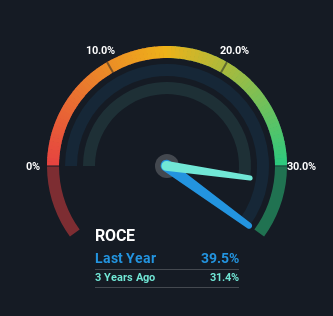- United States
- /
- Professional Services
- /
- NYSE:TNET
Investors Shouldn't Overlook TriNet Group's (NYSE:TNET) Impressive Returns On Capital

What trends should we look for it we want to identify stocks that can multiply in value over the long term? In a perfect world, we'd like to see a company investing more capital into its business and ideally the returns earned from that capital are also increasing. Basically this means that a company has profitable initiatives that it can continue to reinvest in, which is a trait of a compounding machine. And in light of that, the trends we're seeing at TriNet Group's (NYSE:TNET) look very promising so lets take a look.
Return On Capital Employed (ROCE): What Is It?
For those who don't know, ROCE is a measure of a company's yearly pre-tax profit (its return), relative to the capital employed in the business. The formula for this calculation on TriNet Group is:
Return on Capital Employed = Earnings Before Interest and Tax (EBIT) ÷ (Total Assets - Current Liabilities)
0.40 = US$486m ÷ (US$3.7b - US$2.5b) (Based on the trailing twelve months to December 2023).
So, TriNet Group has an ROCE of 40%. In absolute terms that's a great return and it's even better than the Professional Services industry average of 13%.
Check out our latest analysis for TriNet Group

Above you can see how the current ROCE for TriNet Group compares to its prior returns on capital, but there's only so much you can tell from the past. If you're interested, you can view the analysts predictions in our free analyst report for TriNet Group .
How Are Returns Trending?
Investors would be pleased with what's happening at TriNet Group. Over the last five years, returns on capital employed have risen substantially to 40%. The amount of capital employed has increased too, by 22%. The increasing returns on a growing amount of capital is common amongst multi-baggers and that's why we're impressed.
On a separate but related note, it's important to know that TriNet Group has a current liabilities to total assets ratio of 67%, which we'd consider pretty high. This effectively means that suppliers (or short-term creditors) are funding a large portion of the business, so just be aware that this can introduce some elements of risk. Ideally we'd like to see this reduce as that would mean fewer obligations bearing risks.
The Bottom Line
To sum it up, TriNet Group has proven it can reinvest in the business and generate higher returns on that capital employed, which is terrific. Since the stock has returned a staggering 119% to shareholders over the last five years, it looks like investors are recognizing these changes. With that being said, we still think the promising fundamentals mean the company deserves some further due diligence.
If you want to know some of the risks facing TriNet Group we've found 3 warning signs (1 shouldn't be ignored!) that you should be aware of before investing here.
High returns are a key ingredient to strong performance, so check out our free list ofstocks earning high returns on equity with solid balance sheets.
Valuation is complex, but we're here to simplify it.
Discover if TriNet Group might be undervalued or overvalued with our detailed analysis, featuring fair value estimates, potential risks, dividends, insider trades, and its financial condition.
Access Free AnalysisHave feedback on this article? Concerned about the content? Get in touch with us directly. Alternatively, email editorial-team (at) simplywallst.com.
This article by Simply Wall St is general in nature. We provide commentary based on historical data and analyst forecasts only using an unbiased methodology and our articles are not intended to be financial advice. It does not constitute a recommendation to buy or sell any stock, and does not take account of your objectives, or your financial situation. We aim to bring you long-term focused analysis driven by fundamental data. Note that our analysis may not factor in the latest price-sensitive company announcements or qualitative material. Simply Wall St has no position in any stocks mentioned.
About NYSE:TNET
TriNet Group
Provides comprehensive and flexible human capital management services for small and medium size businesses in the United States.
Undervalued with adequate balance sheet.
Similar Companies
Market Insights
Community Narratives




